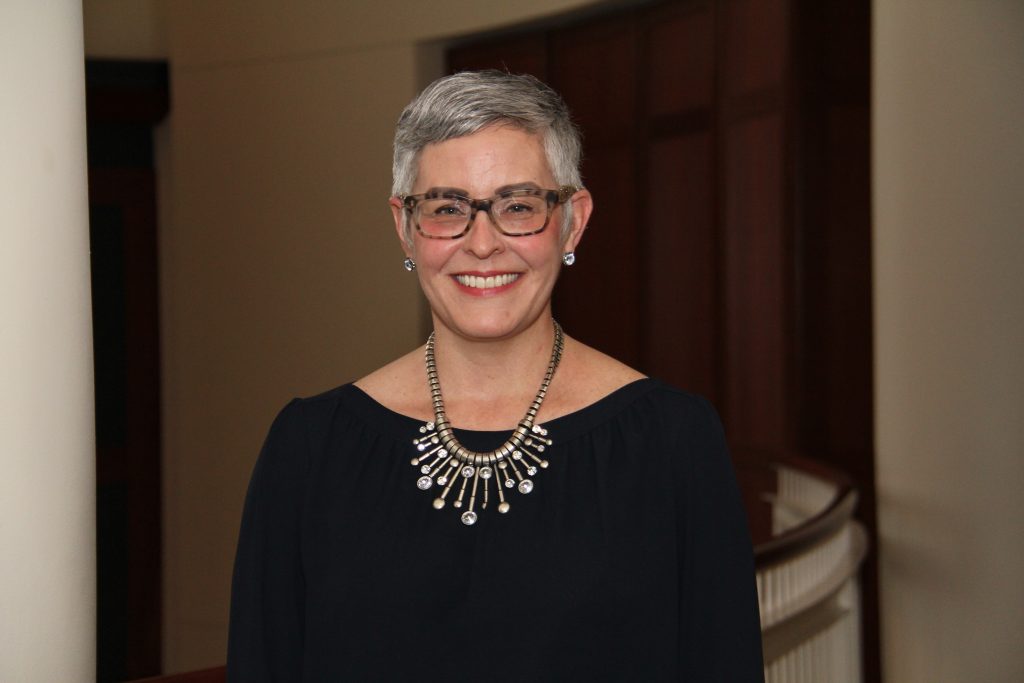Saint Rose political science professor’s anti-racism efforts earn YWCA honor
August 16, 2022 · 2022
The YWCA-Greater Capital Region recently named Dr. Angela Ledford, professor of political science at Saint Rose, the 2022 Resourceful Woman of the Year. The organization praised her strong support for its anti-racism efforts and participation in various panel discussions. The group also cited her advocacy for reproductive justice and abolishing prisons.
A Saint Rose professor since 2002, Ledford challenges her students to examine how race, economics, social class and gender shape American politics. Her classes cover modern political thought, feminist theory and race and mass incarceration.
She is also an author and contributor to numerous scholarly publications. Her 2012 book “Group Representation, Feminist Theory and the Promise of Justice” argues for changing our electoral system in order to increase representation of women and minorities. Ledford also co-authored an article on the politics behind removing the South Carolina Confederate flag.
And since 2014, she has served as professor-in-residence at the New York State Assembly, teaching college interns from across the state, along with her Saint Rose students.
The YWCA-Capital Region will honor Ledford October 19 at 6 p.m. at Franklin Plaza in Troy. (See box below for details on how to attend and support the YWCA’s work.)
Here, she discusses her teaching and how it has evolved.
My specialization in race, class, gender, and sexuality (with a particular emphasis on race in America) arose from my deep concern at a young age with the nature of power and injustice. One of my most vivid memories was watching a PBS documentary on the Holocaust. I was probably 11 or 12. Growing up in rural west Texas, I had not learned anything about it in school, so I started checking out books from the library. The horror was truly too much for me to grasp, but I knew it was important to try to understand.
My work has evolved over time to take in the important nuances and complexities of intersectionality, material conditions, and social, political, and economic hegemony.
As Saint Rose classrooms become more reflective of the larger society, what are you learning from your students?
Because I teach political theory, my courses are intrinsically tied to what is happening in the world. I always say that we teach and learn together. I’ve learned so much from my students’ lived experiences, which help inform the larger structural analysis I hope to impart to them.
Are there front-burner topics in the news this summer that will find their way into your teaching?
Always. I taught democratic theory last fall, and I had to rethink the course entirely, given global shifts toward authoritarianism, autocracy, and fascism. Much of that course ended up being about the devolution toward de-democratization, and, as Sheldon Wolin (the late political theorist from Princeton) put it, the “shrinking of the political.”
How does your work in the classroom, and Capitol, flow into the community?
It is crucial for anyone, regardless of their career aspirations, to understand how government works. Politics isn’t something you can opt out of, as much as one might want to. If you opt out, you are actively participating in the reinforcement of the status quo. And I think we can all agree things aren’t okay as they are, though we’ll surely disagree about what isn’t okay and what we should do about it.
Theory and practice are mutually tied. There is no practice without some theoretical (no matter how sophisticated or mundane) foundation. And, as the Black Panther, Fred Hampton stated, “theory is cool, but theory without practice ain’t sh*t.”
What do you tell your three children (two boys and a girl) about your work?
We talk about things happening in the world as they bring them up. When they hear about something that concerns them, and I’d say climate change, women’s rights, and racial justice come up the most, we have a conversation. I ask them loads of questions about their thoughts and worries. And we talk about how to go about finding credible information and data to inform their thinking. Then we talk about how that knowledge requires action.
Finally, what is Ledford’s law?
Haha! How’d you hear about that?!
Ledford’s Law is that you cannot bring up human nature as a defense for an argument. Notions about human nature have never been stable across time or geography, but a reliance on a particular conception of it (especially dominant ones at any given time/region) can be incredibly persuasive and powerful, leading to a redirection and rejection of aspirations and notions of the Good and the Just without deeper contemplation. This harms us all in our collective pursuit of what is right.
About the event
The 2022 Resourceful Women’s Awards Luncheon, scheduled for 6 p.m. October 19 at Franklin Plaza in Troy, has a fundraising goal of $60,000 to benefit the work of the YWCA-GCR provides. YWCA-GCR is “one of the area’s largest providers of supportive housing to both single women and women with children who would otherwise be homeless or living in substandard housing.”
Tickets range from $125 to $350 and can be ordered online.


